|
From the Executive Director
|

C
lasses for photonics technician students are underway; a new year has begun at our OPCN colleges. The articles in this issue about Guadalupe Esparza and Justin Jenson encourage all of us who are involved in educating photonics technicians. These examples represent the potential for our work to bring rewarding careers to deserving students.
Many of your new students will need that "extra help" to fully understand and use the essential mathematics required of technicians. I urge you to consider the resources
OP-TEC offers for student remediation in mathematics (see article).
The first article in this newsletter is a reminder of the NSF/ATE grant opportunities that are available to you to receive financial support for your program. If you can't make the October 5th deadline then begin discussions and preparation for next year's submission. The support you receive from the OP-TEC,
LASER-TEC and MPEC centers also comes from our NSF/ATE grants, but several colleges teaching photonics have also received project grants. You should consider competing for these grants.
Articles on the work of LASER-TEC and MPEC show the effectiveness of our regional center leadership.
Dan Hull
|
 |
|
NSF/ATE Grant Opportunities
|
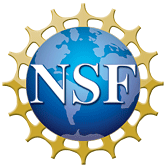
NSF/ATE Grant Opportunities for Photonics Technician Education Programs
Two year colleges can obtain grants for program improvement from the National Science Foundation's Advanced Technological Education (NSF/ATE) fund. Approximately $60 million in NSF/ATE grants are annually awarded, primarily to two-year colleges. OP-TEC (which is funded by NSF) has helped over ten colleges obtain project grants to support their photonics programs.
If your college has not received an NSF grant in the past several years, you could be eligible for a $200,000 award under "grants for colleges new to NSF/ATE". Your opportunity to receive funding from NSF is most likely if you apply in this category. Deadline for submission of proposals is October 5, 2017. Our staff is available to assist your college in preparing a grant application.
|
 |
|
Instructor Resource of the Month
|
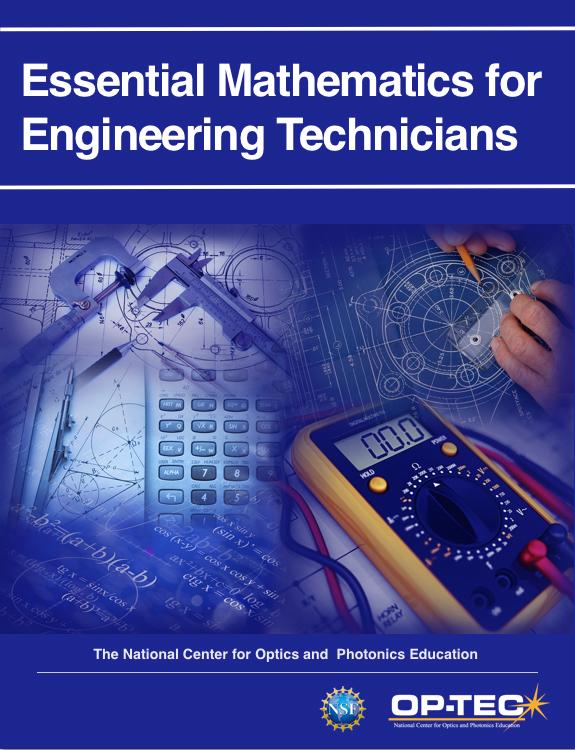
Essential Mathematics for
Engineering
Technicians eTextbook
Mathematics skills are essential for satisfactory progress in typical two-year engineering technology education programs. To help aspiring engineering technicians begin their studies with adequate math skills, OP-TEC has developed an eTextbook, Mathematics for Engineering Technicians.
The text is intended for use by ET faculty to assist students in understanding technical concepts and acquire problem-solving skills. The material can be used in several ways:
- Presented as a whole in a "regular class" with teacher lecture and practice sessions.
- Assigned for appropriate students to "learn on their own" with occasional instructor monitoring and help.
- Used "piecemeal" in a self-learning mode, with some instructor help, by students who require review or brush up.
- As a student and faculty reference for math-based ET classes
The following topics are covered: Scientific Notation, Unit Conversion, Introductory Algebra, Powers and Roots, Ratio and Proportion, Exponents and Logarithms, Graphing in Rectangular Coordinates, Geometry, Angle Measures in Two and Three Dimensions, Trigonometry, Special graphs, Sinusoidal Motion, and Complex Numbers.
Each chapter features the following: an Objectives & Scenario Question, a Basic Concepts section, a Solution to the Scenario Question, Practice Exercises, Real World Connections and Applications, Scenario Questions, and Career and Mathematical Videos. Videos are embedded in the eTextbook and are also posted online at
http://optecvideo.opteccrm.org.
The downloadable eTextbook is available as an iBook for Apple devices and also in Interactive PDF format for non-Apple devices at
www.optecstore.org.
|
 |
NSF Awards Photonic Education Grant to IRSC
|
LASER-TEC Award
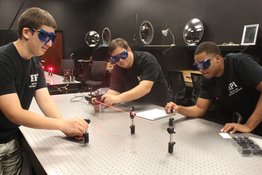
The National Science Foundation (NSF) has awarded a $2.6 million Advanced Technological Education (ATE) grant to Indian River State College (IRSC) to expand the operations of LASER-TEC, the southeast regional center increasing the number of skilled laser and fiber optics (LFO) technicians.
Based in Fort Pierce, Florida, LASER-TEC was established in 2013 with a $2.9 million NSF grant and, since its inception, has partnered with 21 colleges and universities and 147 companies to strengthen training to meet industry demand.
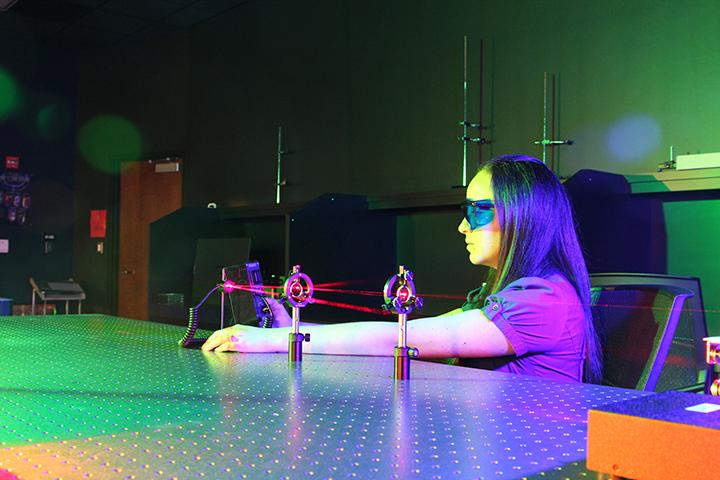
Over 450 students annually have taken laser and fiber optics
courses at participating colleges. Funded over the next four years by the new NSF grant, LASER-TEC plans to expand the network to include more educational institutions and companies from different sectors of the economy eager to employ the specialized technicians. The U.S. Department of Labor projects the demand for LFO technicians at almost six times the supply.
"There is an urgent need to continue to ramp up the production of
laser and fiber optics technicians to satisfy the high demand, maintain our world leadership and create high-paying jobs," said Edwin Massey, president of IRSC. "LASER-TEC has earned a national reputation as a model of best practices. With this new grant, the center will be able to expand programs throughout the Southeast to create a pipeline of highly skilled technicians."
Enabling students to earn an associate in science degree in lasers and fiber optics in two years, a trio of LASER-TEC schools, IRSC, Central Carolina Community College in North Carolina and
Tri-County Technical College in South Carolina, graduated 98 students in 2016 with the niche specialization in lasers and fiber optics.
LASER-TEC has
created
educational modules for high-intensity LED manufacturing, semiconductor processing of photonic devices, solid-state crystal growth and solid-state, high-power pulsed laser design and construction. Plans call for new modules in spectroscopy, LED lighting and illumination design.
Strong collaboration has ensured training links to industry, including partnerships with Corning Fiber Optical Systems, Lawrence Livermore National Laboratory, Lockheed Martin, Northrup Grumman and Harris Corporation.
"The continuing support and funding from NSF is a testament to the leadership role LASER-TEC plays in the preparation of highly skilled technicians needed by the most advanced technology companies as they move deeper into the 21st century," said Chrys Panayiotou, principal investigator of LASER-TEC and chair of IRSC's electronics engineering technology department.
|
 |
|
Irvine Valley College Photonics Curriculum
|
|
All of the courses in the IVC Photonics curriculum have been approved by the Electronics Technicians Association (ETA) International making Irvine Valley College an official ETA International Certification Testing Facility. IVC photonics graduates are now eligible to sit for the ETA certification exams for:
- Photonics Technician Operator (PTO)
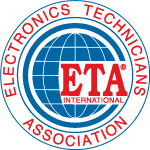
- Photonics Technician Specialist (PTS)
- Specialist in Precision Optics (SPO)
- Technician in Precision Optics (TPO)
|
|
Lasers in Manufacturing Symposium 2017
|

MPEC Sponsoring Technical Symposium
October 5, 2017 9:00 am - 4:00 pm
TRUMPF Inc. and the Midwest Photonics Education Center (MPEC) of Indian Hills Community College and have partnered to offer this Lasers in Manufacturing Symposium. It is designed for industry professionals, educators, and students interested in learning about laser systems considerations and a variety of laser applications in multiple industries. The symposium will feature seven subject matter experts from across the nation presenting on topics such as laser welding, 3D metal printing, and advances in prevalent & emerging ultrafast applications. Tabletop exhibits and an "Ask the Expert" table will be highlighted.
A live demonstration of a Trumpf TruLaser Station 5005 laser welder and a tour of the IHCC Laser & Optics laboratory will be included. Registration is complimentary and lunch will be provided.
This event is supported in part through a National Science Foundation Grant DUE#1400561.
For questions, please call 641-683-5312.
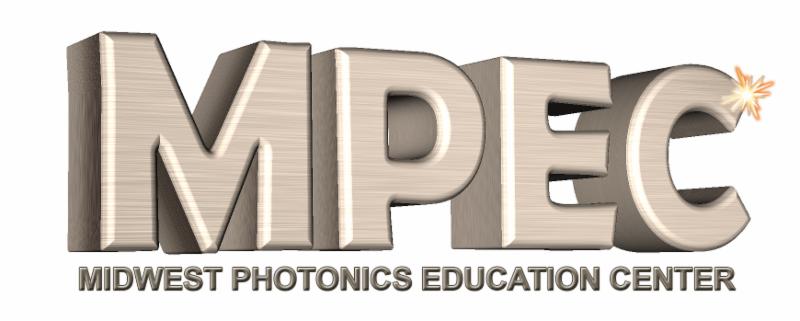
|
 |
OP-TEC Opens Fall Online Faculty
Development Courses
|
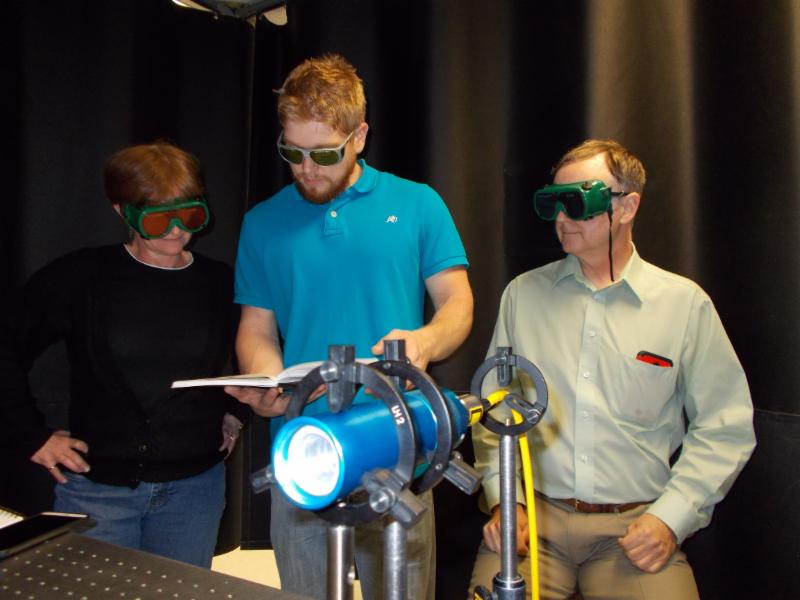 OP-TEC recently opened new sections of its online professional development courses that prepare faculty, adjuncts, and laboratory staff to teach with the Fundamentals of Light and Lasers (Course 1) and Laser Systems and Applications (Course 2) textbooks. OP-TEC recently opened new sections of its online professional development courses that prepare faculty, adjuncts, and laboratory staff to teach with the Fundamentals of Light and Lasers (Course 1) and Laser Systems and Applications (Course 2) textbooks.
These Open Entry/Open Exit courses have been developed for faculty whose schedules demand a more flexible course timeline. They are perfect for busy faculty who might have difficulty keeping up with weekly assignments in a "scheduled" course, but who would have a period or periods of time during the semester or school year that would allow them to complete assignments and exams independently and at their own pace. It is also an excellent opportunity for junior faculty, adjunct faculty, and lab technicians who may need to prepare to teach a college level or dual credit introductory photonics, optics, or lasers course. OP-TEC highly encourages all colleges with photonics programs to maintain at least two highly trained and experienced photonics instructors.
The courses are offered through the Canvas online learning management system 24/7 through May 31, 2018. They are facilitated by instructors experienced in teaching photonics concepts at the college level and will require a high level of independent self-paced instruction.
Participants who successfully complete their online course will be invited to an optional (but very highly recommended) hands-on laboratory capstone experience to be held in June 2018 at Indian Hills Community College in Ottumwa, Iowa. The capstone will provide participants the opportunity to conduct most of the laboratory experiments included in the course and discuss with experienced instructors best practices for teaching the materials. Participants who successfully complete the online course and the 3-day hands-on laboratory session will receive a certificate of completion and may apply for CEUs from an OP-TEC partner college.
These courses are being offered at no charge to U.S. high school, community college and technical college faculty interested in teaching a basic photonics course. However, participants will be responsible for travel, lodging, and some meals to attend the optional 3-day laboratory capstone session.
For information and online applications, please visit:
|
 |
|
|
10/5/2017
Lasers in Manufacturing Symposium
Ottumwa, IA
|
| 10/16/17 - 10/19/17
Rochester, NY
|
|
Horatio Alger National Career and Technical Scholarship
|
Irvine Valley College Laser and Photonics Technology student, Guadalupe Esparza has been awarded a Horatio Alger National Career and Technical Scholarship. The Horatio Alger Association of Distinguished Americans is dedicated to the simple but powerful belief that hard work, honesty and determination can conquer all obstacles. As such, the Association honors the achievements of outstanding individuals in our society who have succeeded in spite of adversity and who are committed to supporting young people in pursuit of increased opportunities through higher education.
Scholarships are awarded to students who have faced and overcome great obstacles in their lives who wish to pursue a career or technical education at an accredited non-profit post-secondary institution in the United States.
Applications for students enrolling in Fall 2018 will open online March 15, 2018.
For more information about the Horatio Alger Association, please visit
www.horatioalger.org.
|
 |
Justin Jenson
was fresh out of high school and knew he wanted a career in engineering. While searching for the right school and degree program he came across Indian River State College (IRSC). He decided to pursue an associate of arts degree which would enable him to transfer into a four-year university program, and an associate of science degree and certificate in lasers and photonics which would help him get a job while he finished his studies.
Justin's decision was also based on his own research. He researched job opportunities and requirements for photonics technicians, as well as salaries and the overall job market for technicians.
When Justin started classes, he found a challenging environment that was full of hands-on engagement.
His classes covered soldering, assembly and testing, and all of them combined theory and application.
He graduated in May 2010 with an associate of arts degree in engineering, an associate of science degree in electronics engineering technology, and a certificate in lasers and photonics
During his time at IRSC, Justin was hired by MicroWatt Applications as their first intern and eventually became a project manager. Justin went on to attend Florida State University, where he graduated in May 2014 with a bachelor of science degree in chemical engineering and a specialization in materials science.
Laser Components Pyro Group hired Justin as a Project Engineer. Justin is in charge of materials processing for the research and development division, designing new products and bringing the current product line to market. Justin loves that his job is stimulating and that he is constantly challenged to improve his technical skills and people skills.
|
 |
 |
The Committees of the Optics and Photonics College Network are dedicated to sharing expertise, best practices, resources, and advice on issues of importance to photonics technician educators at colleges throughout the United States.
|
Professional
Development
Committee
Anca Sala, Chair
|
Student Recruiting
Committee
Christine Dossey
|
Program Assistance Committee
Gary Beasley, Chair
|
Equipment Committee
Frank Reed, Chair
|
|
 |
|